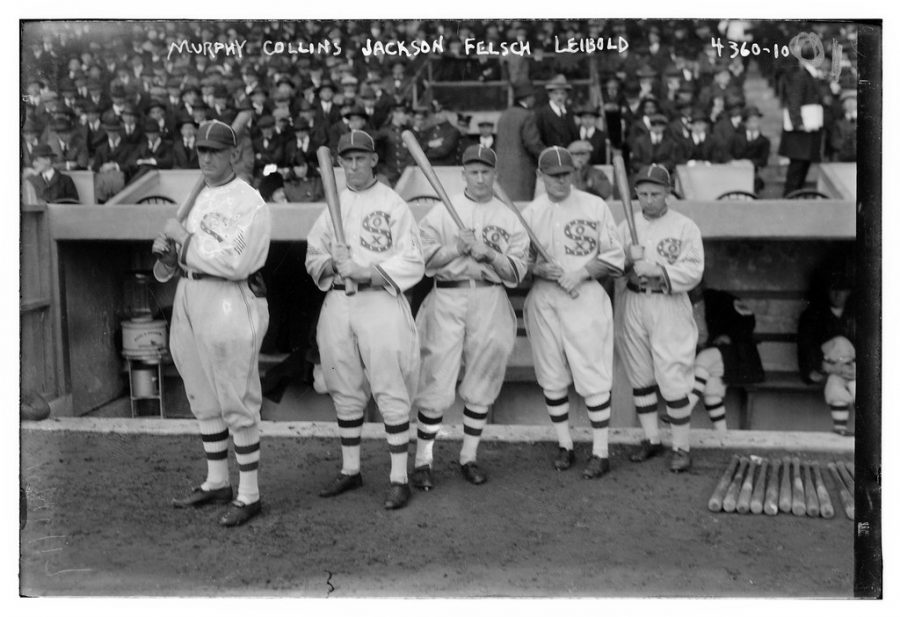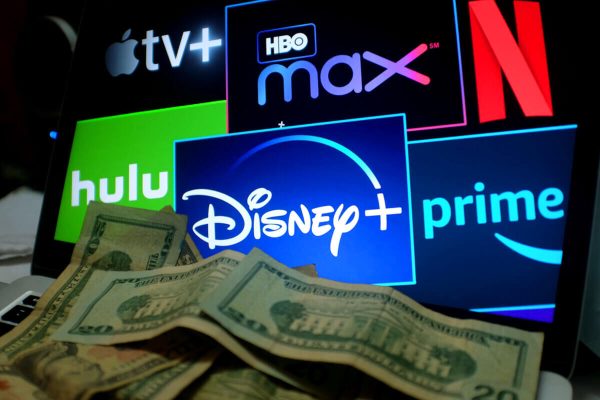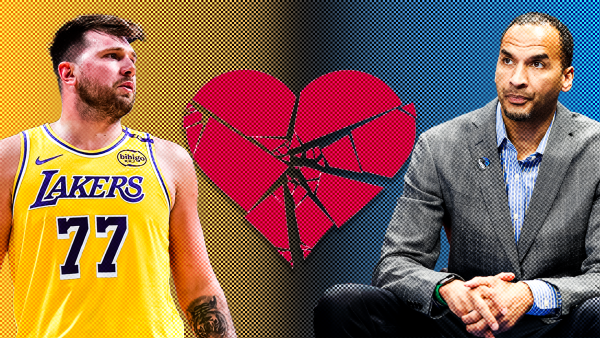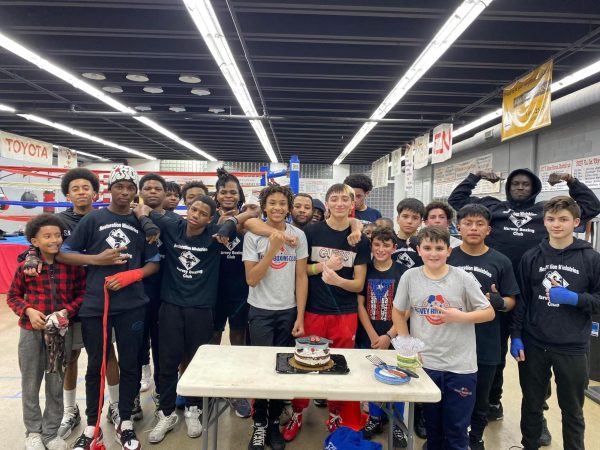Controversy Runs Sports
Photo by pingnews.com, Creative Commons
Two of the eight members of Chicago White Sox – Joe Jackson (middle) and Happy Felsch (second to the far right) – who were banned for throwing the 1919 World Series.
In 1919, eight members of the Chicago White Sox were banned from baseball for life after being accused of throwing the World Series to the Cincinnati Reds. These now infamous eight players decided to intentionally lose the series in exchange for money from a New York gambling ring. This notorious event, now known as the Chicago Black Sox scandal, was one of the earliest American pro sports controversies.
Even though eight players were ultimately banned from playing America’s pastime at a professional level again, the Black Sox are still in the thoughts of baseball fans and historians around the world of sports 102 years later.
So at the end of the day, was this scandal really all that bad for baseball or even all of professional sports for that matter? Is any controversy bad for the respective organization or corporation that it occurs? Sure, at the time controversy may seem to shine a bad light on sports, but in the long run it ultimately brings more attention – positive or not – on its respective league.
Controversy does not only reside in sports, but also in everyday life. Whether it’s on Twitter, CNN, TMZ or even in your personal life, controversy keeps people entertained. From the daily drama posted on social media platforms or gossip shared by blogs around the world wide web, if there was no such thing as the “latest hot controversial take”, there wouldn’t be much to talk about, and this very philosophy goes hand in hand with sports.
Just because the Black Sox scandal happened 102 years ago doesn’t mean that controversy in sports is a rare occurrence. Less than three years ago, there have been two different instances of proven cheating in the MLB.
In the past two years, both the Houston Astros and the Boston Red Sox have been punished due to their involvement in separate sign stealing scandals. The Astros, winners of the 2017 World Series, and the Red Sox, winners of the 2018 World Series, both decided to steal opposing pitchers’ signs in an attempt to gain an unfair advantage during their respective World Series, which both came against the Los Angeles Dodgers.
Even after the Astros and Red Sox were proven guilty of cheating, they were given full immunity and received no punishments. Unfortunately, fans never got the opportunity to witness animosity between the Astros and their opponents in-person during the regular season due to COVID-19, but they were able to enjoy the fireworks from the comfort of their living room throughout the shortened 2020 regular season.
After this information came out less than a year ago, fans across the world of sports, including myself, were interested in how opposing teams and players would react to this information knowing that the Astros and Red Sox had cheated on the highest stage of professional baseball.
According to the Houston Chronicle, the Astros recorded their largest regular-season audience on AT&T SportsNet Southwest for their 2020 home-opening series against the Mariners. This series viewership was almost double the average for Houston’s first three home games in the 2019 season.
Increased television viewership was bound to happen based on the fact that fans were not able to attend games, but the sheer curiosity of not knowing whether opposing pitchers would take exception to these cheating allegations played a massive role as well.
While there wasn’t too much obvious bitterness from the rest of MLB towards the Astros, it wasn’t until a game between the Dodgers and the Astros on July 28 that eager sports fans finally got what they came to the MLB to see… FIREWORKS!
These weren’t the fireworks that you see dancing through the night sky during the Fourth of July, but the kind of fireworks where three years of built up tension – from a team that was cheated out of their first World Series win in over 29 years not once, but twice – was finally released over a Tuesday night game of baseball.
The Astros had been hit by seven pitches during the first five games of spring training, but none truly aggravated the Astros more than a high over the head pitch from Dodgers pitcher Joe Kelly, who had been on the opposite side – along with the majority of MLB players – of this scandal in the 2017 World Series.
Benches later cleared but nothing too physical happened because we are in a global pandemic after all, nonetheless it’s safe to say that the Dodgers-Astros rivalry escalated to greater heights after news of this sign stealing scandal broke.
At the end of the day this controversy proved to do more good than bad for the MLB. For one, it brought more attention to a sport that has been slowly deteriorating in viewership as of the past decade and it made baseball “actually exciting”, which has been a common stigma for baseball for as long as I can remember.
These first examples have mainly been focused on baseball, but another sport that has an arguably more controversial history is the sport of boxing. While many younger sports fans may not know, boxing was truly at its highest point from the 1920s to the 1950s. Like many things during this period of time, boxing was under the influence of organized crime such as different mobs around the U.S.
Mobs first moved into boxing during the 1930s and profited by corrupting and exploiting the sport during its peak. This of course brought mostly negative attention towards boxing, especially when judges would turn in questionable and obviously fixed scorecards in favor of the clear loser during certain fights.
One of many perfect examples of a rigged fight happened in a bout between Kid Gavilan and Billy Graham in 1951. Gavilan was a mob-controlled fighter, and if a fight was close, the judges would be sure to give the edge to Gavilan, and that’s exactly what happened.
After 15 rounds, Graham was clearly robbed of a win. Going into this fight, there was a lot on the line, inucling the NBA Welterweight World Title, which made the final decision even more controversial.
In following years, mobs slowly began to move on from boxing after numerous FBI investigations, but that still didn’t stop the sport from continuing to be controversial.
On Nov. 14, 2020; another addition to the list of controversial decisions in boxing occured. In a rematch featuring Andrew Moloney and Jashua Franco for the super flyweight title, the fight was quickly stopped by doctors following the second round after an apperent headbut caused Franco’s right eye to swell shut.
Moloney had one loss on his record going into the fight, that coming in his first fight against Franco, so this bout not only had high implications because of the super flyweight title, but also because Moloney was looking to avenge his first loss.
And as expected, to make sure the fight was correctly called a no-decision, referee Russell Mora watched rounds one and two to find where the headbut occured.
Like many other sports, boxing too has adopted instant replay review. Just two months before this fight happened, according to ESPN, the Nevada State Athletic Commission (NSAC) implemented new procedures for instant replay that included an outside-the-ring review official and a yellow light on the ring apron, which will signify a review.
So how exactly is this controversial? Well, after a long 26-minute delay there was no proof or video evidence of a headbut ever occurring! According to instant-reply, Franco’s right eye was swollen shut due to 50 jabs, not a headbut. The no-decision stood and cheated Moloney out of a super flyweight title, which he obviously should’ve been awarded.
With all this technology implemented to prevent wrong decisions, how could this possibly happen? Was this another instance of a rigged fight or did the referee genuinely decide on the wrong decision?
Hours after the fight, Moloney and his team decided to file an appeal with the Nevada State Athletic Commission on this controversial decision, so the ultimate ruling is in the hands of the NSAC.
While the Moloney v. Franco fight was the featured co-main event, a majority of boxing fans were waiting to witness one of the most prominent athletes in the sport, Terence Crawford, fight in the main card. So instead of focusing on the main-event, many fans were shocked at the decision handed out during the co-main event that it brought a lot more attention to the night of boxing than originally advertised.
Obviously, boxing is not nearly as popular as it once was but controversial decisions like these are what keep people talking about the sport and ultimately keep boxing alive.
From rigged score cards, judges, fighters and athletes influenced by the mob, to players trying to gain an unfair advantage over their opponents, there is one last classic example that must be brought up when talking about controversy in sports.
Most would not think that a team who consistently has successful seasons year-in and year-out would have any reason to cheat. Well, the New England Patriots would beg to differ.
I would assume that most fans have heard of the infamous “DeflateGate” scandal. At halftime during the 2014 AFC Championship game, the Patriots not only entered the locker room with a 17-7 lead, but they also had partially deflated footballs.
According to ESPN, the NFL concluded that the New England Patriots used an illegal process for lowering the inflation of game footballs at the request of Tom Brady, who preferred to grip and throw softer footballs.
The NFL later spent over $22.5 million throughout the next two years to investigate and discipline Brady and the Patriots. Even with all of that money used to investigate them, neither Brady nor the Patriots organization came out and spoke about what really happened.
It has been over six years since DeflateGate was said to have occured, but did it really? Was the NFL ever able to find distinguishable evidence to determine whether or not the Patriots actually used deflated footballs to their advantage? Will either the Patriots or Tom Brady ever respond to these allegations of cheating in the AFC Championship Game? Was this just a ploy to make the NFL’s biggest dynasty look bad?
All of these questions are now a part of the mystery that is DeflateGate. The Patriots, who had three super bowl titles at the time of occurrence, gained the eyes and attention of NFL fans across the world who were anxiously waiting to hear whether or not the organization actually cheated.
Since these fans never got a definitive answer, they are still waiting for whatever drama will potentially still come from this six-year-old scandal. Sure, there have been a few more controversies since DeflateGate, but it is by far the most mysterious circumstance in NFL history.
Now that it has been 102 years since the Chicago Black Sox made their name heard across radios and towns throughout America, sports have added numerous scandals to its expansive list of controversies over the past century.
From all and any sports watched by fans around the world, controversy causes an increase in viewer/listenership, ticket sales, excitement and many other things.
Without controversy, sports would constantly be the same. Without controversy in sports, there would be nothing other than a constant rotation of games. By constantly talking about the same old games, there wouldn’t be anything new and exciting to talk about.
For instance, think of a movie that you’ve most recently watched. In any and every genre, nine times out of ten, there is going to be a twist somewhere during the film whether it be in the beginning, middle or end. Now think of that particular plot twist and how it impacted the outcome of the movie.
Did it increase excitement or suspense? Did it get you wondering “what happens next” or “how is this going to impact the plot”? Were you invested into the characters and the outcome? Assuming the movie was good, your answer is probably yes to all of these questions.
This is exactly the reason why controversy or a “plot twist” is important for sports. It gets people invested into the players and the sport that it is involved with. No controversy equals no excitement.
So the next time you decide to turn on an Astros game or watch a boxing match and the judges get the final decision wrong, think about all the reasons why that respective controversy may be good for the corporation that it occurs. Sports, media, and even LIFE thrive off of controversy!






